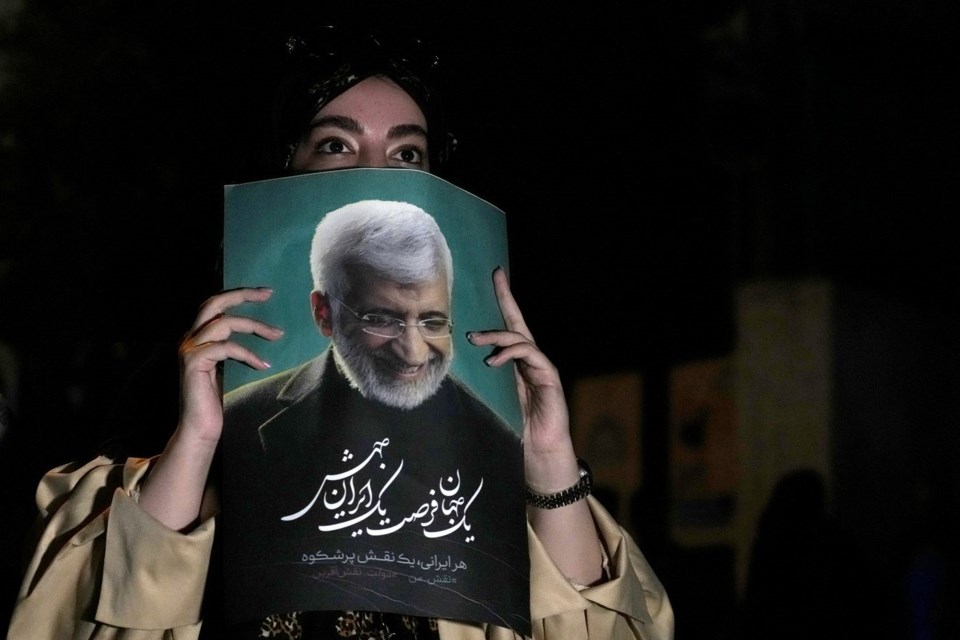DUBAI, United Arab Emirates (AP) — Two candidates in Iran's presidential election withdrew from the race as the country prepared Thursday for the upcoming vote, an effort by hard-liners to coalesce around a unity candidate in the polls to replace .
Amirhossein Ghazizadeh Hashemi, 53, dropped his candidacy and urged other candidates to do the same “so that the front of the revolution will be strengthened,” the state-run IRNA news agency reported late Wednesday night.
Ghazizadeh Hashemi served as one of Raisi’s vice presidents and as the head of the Foundation of Martyrs and Veterans Affairs. He ran in the 2021 presidential election and received some 1 million votes, coming in last place.
On Thursday, Tehran Mayor Alireza Zakani also withdrew, as he did previously in the 2021 election in which Raisi was voted into office.
Zakani said he withdrew to “block the formation of a third administration” of former President Hassan Rouhani, a reference to reformist candidate Masoud Pezeshkian. Pezeshkian is running with the support of former Iranian Foreign Minister Mohammad Javad Zarif, who under Rouhani reached .
Such withdrawals are common in the final hours of an Iranian presidential election, particularly in the last 24 hours before the vote is held when campaigns enter a mandatory quiet period without rallies. Voters go to the polls Friday.
The two withdrawals leave . Analysts broadly see the race as a three-way contest.
Two hard-liners, former nuclear negotiator Saeed Jalili and parliamentary speaker Mohammad Bagher Qalibaf, are fighting over the same bloc, experts say. Then there's Pezeshkian, a cardiac surgeon who has sought to associate himself with Rouhani and other reformist figures like former President Mohammad Khatami and those who led the 2009 Green Movement protest.
Iran’s theocracy under Supreme Leader Ayatollah Ali Khamenei has maintained its stance of not approving women or anyone urging radical change to the country’s government for the ballot. However, Khamenei in recent days has called for a “maximum” turnout in the vote, while also about relying on the United States.
Widespread public apathy has descended in the Iranian capital over the election, coming after .
After the promise nearly a decade ago of Tehran’s nuclear deal opening up Iran to the rest of the world, Iranians broadly face and a far more uncertain Middle East that already has seen . Iran also now enriches uranium at nearly weapons-grade levels and if it choses.
The limited options in the election, as well as widespread discontent over , has some saying they won't vote.
“I did not watch any of the debates since I have no plan to vote,” said Fatemeh Jazayeri, a 27-year-old unemployed woman with a master’s degree. “I voted for Rouhani seven years ago, but he failed to deliver his promises for a better economy. Any promise by any candidates will remain on paper only.”
Worshippers in Tehran at Friday prayers in recent weeks, typically more conservative than others in the city, appeared more willing to vote.
Ma0hmoud Seyedi, a 46-year-old shopkeeper, said he and his wife, alongside two young daughters, will vote,
“My wife and I have decided to vote for Qalibaf since he knows how to solve problems of the country because years of experience but my daughters are thinking about Jalili, too,” he said. “By the way, voting is a duty for us.”
Parivash Emami, 49, another at prayers, said she hoped his vote could help Iran overcome its problems.
“Qalibaf knows details of problems, the rest are either critics or promise to solve problems without offering any program,” Emami said.
___
Karimi reported from Tehran, Iran.
Jon Gambrell And Nasser Karimi, The Associated Press



